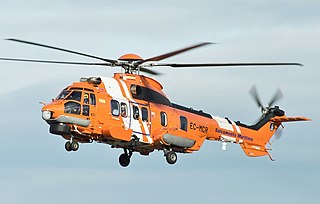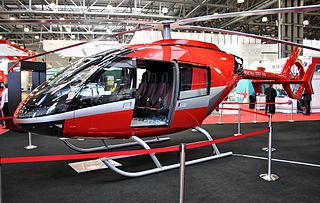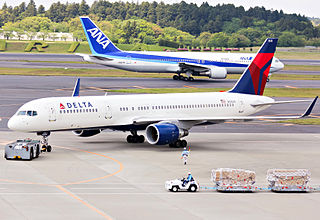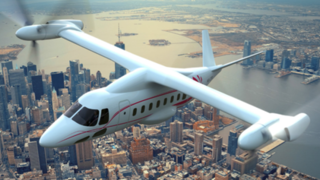Airbus Helicopters SAS is the helicopter manufacturing division of Airbus. It is the largest in the industry in terms of revenues and turbine helicopter deliveries. Its head office is located at Marseille Provence Airport in Marignane, France, near Marseille. The main facilities of Airbus Helicopters are at its headquarters in Marignane, France, and in Donauwörth, Germany, with additional production plants in Canada, Brazil (Helibras), Australia, Spain, Romania, the United Kingdom and the United States. The company was renamed from Eurocopter to Airbus Helicopters on 2 January 2014. In 2018, Airbus delivered 356 helicopters, a 54% share of the civil or parapublic market over five seats.

The Rolls-Royce Turbomeca RTM322 is a turboshaft engine produced by Safran Helicopter Engines. It was originally conceived and manufactured by Rolls-Royce Turbomeca Limited, a joint venture between Rolls-Royce plc and Turbomeca. The engine was designed to suit a wide range of military and commercial helicopter designs. The RTM322 can also be employed in maritime and industrial applications.

The Future Combat Air System (FCAS), French: Système de combat aérien du futur; SCAF; Spanish: Futuro Sistema Aéreo de Combate; FSAC) is a European combat system of systems under development by Dassault Aviation, Airbus and Indra Sistemas. The FCAS will consist of a Next-Generation Weapon System (NGWS) as well as other air assets in the future operational battlespace. The NGWS's components will be remote carrier vehicles as well as a New Generation Fighter (NGF) - a sixth-generation jet fighter that by around 2040 will replace current France's Rafales, Germany's Typhoons and Spain's EF-18 Hornets.

The Eurocopter EC135 is a twin-engine civil light utility helicopter produced by Airbus Helicopters. It is capable of flight under instrument flight rules (IFR) and is outfitted with a digital automatic flight control system (AFCS). First flying on 15 February 1994, it entered service in 1996 and 1,400 have been delivered up to September 2020 to 300 operators in 60 countries, accumulating over 5 million flight hours. It is mainly used for helicopter emergency medical services, corporate transport, law enforcement, offshore wind support, and military flight training. Half of them are in Europe and a quarter in North America. The H135M, certified under the name Eurocopter EC635, is a military variant.

Safran S.A. is a French multinational company that designs, develops and manufactures aircraft engines, rocket engines as well as various aerospace and defense-related equipment or their components. It was formed by a merger between SNECMA and the defense electronics specialist SAGEM in 2005. Safran's acquisition of Zodiac Aerospace in 2018 significantly expanded its aeronautical activities.

The Airbus Helicopters H225 is a long-range passenger transport helicopter developed by Eurocopter as the next generation of the civilian Super Puma family. It is a twin-engined aircraft and can carry up to 24 passengers along with two crew and a cabin attendant, dependent on customer configuration. The helicopter is marketed for offshore support and VIP passenger transport duties, as well as public service missions.

The Airbus Helicopters H175 is a 7-ton class super-medium utility helicopter produced by Airbus Helicopters. In China, the H175 is produced by the Aviation Industry Corporation of China (AVIC) as the Avicopter AC352. Originally launched as the Eurocopter EC175 and the Harbin Z-15, it has been referred to as being a 'super-medium' helicopter.

The Safran Silvercrest is a French turbofan under development by Safran Aircraft Engines.

The Safran Ardiden is a 1,400–2,000 hp (1,000–1,500 kW) turboshaft designed and produced by Safran Helicopter Engines for 5–8 t (11,000–18,000 lb) single and twin-engine helicopters. Launched in 2003 as a more powerful TM 333, it first ran in 2005 and was introduced in 2007. The Ardiden 1 Shakti powers the Indian HAL Dhruv, Light Combat Helicopter and Light Utility Helicopter while the more powerful Ardiden 3 powers the Avicopter AC352 and Kamov Ka-62.

The CFM International LEAP is a high-bypass turbofan engine produced by CFM International, a 50–50 joint venture between American GE Aviation and French Safran Aircraft Engines. It is the successor of the successful CFM56 and competes with the Pratt & Whitney PW1000G to power narrow-body aircraft.

The Eurocopter X³(X-Cubed) is an experimental high-speed compound helicopter developed by Airbus Helicopters. A technology demonstration platform for "high-speed, long-range hybrid helicopter" or H³ concept, the X³ achieved 255 knots in level flight on 7 June 2013, setting an unofficial helicopter speed record. In June 2014, it was placed in a French air museum in the village of Saint-Victoret.

The AgustaWestland AW189 is a twin-engined, super-medium-lift helicopter manufactured by Leonardo S.p.A. It is derived from the AW149, and shares similarities with the AW139 and AW169.

The Bell 525 Relentless is an American super-medium-lift helicopter, under development by Bell Textron. The Bell 525 was unveiled at the 2012 Heli-Expo in Dallas, Texas in February 2012. The helicopter first flew on 1 July 2015. It is designed to transport up to 19 passengers.

The Kopter AW09 is the Leonardo Helicopter Division's five-to-eight seat, single-engine multirole helicopter which is currently under development at Kopter’s facilities. It is a clean-sheet design amongst a market sector dominated by decades-old airframe designs.

The Airbus Helicopters H160 is a medium utility helicopter being developed by Airbus Helicopters. Formally launched at Heli-Expo in Orlando, Florida on 3 March 2015, it is intended to replace the AS365 and EC155 models in the firm's lineup. In June 2015, the first test flight took place. It received its EASA type certification in July 2020, and first deliveries were in December 2021.

The New Midsize Airplane (NMA), or New Midsize Aircraft, is a concept airliner proposed by Boeing to fill the middle of the market segment.
The Safran Arrano is a turboshaft engine for two-to-three ton single-engine and four-to-six ton twin-engine helicopters, developed by Safran Helicopter Engines, outputting 1,100 to 1,300 hp.

Guillaume Faury is a French engineer and businessman. He is the current Chief Executive Officer (CEO) of the aerospace corporation Airbus SE as well as the Chairman of its civil aircraft division, Airbus SAS.

The Airbus RACER is an experimental high-speed compound helicopter developed by Airbus Helicopters from the Eurocopter X³. Revealed at the June 2017 Paris air show, final assembly will start in mid-2020 for a 2021 first flight. Cruising up to 400 km/h (216 kn), it aims for a 25% cost reduction per distance over a conventional helicopter.

The Leonardo Next-Generation Civil Tiltrotor is a tiltrotor aircraft demonstrator designed and developed by the Italian aerospace company Leonardo S.p.A. Studies for a two times larger tiltrotor than the AgustaWestland AW609 started in 2000. Since 2014, its development is sponsored by the European Union's Clean Sky 2 program. By 2017, the maiden flight had been pushed back to 2023, from a 2020 initial plan. By May 2021, major components were under production


















